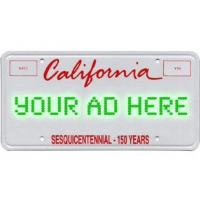Privacy Advocates Skeptical of Pilot Program for Digital License Plates

Californians who feel vulnerable because the state doesn’t know where they are whenever they operate their vehicles will probably welcome passage of Senate Bill 806, currently halfway through the legislative process.
But privacy advocates are wary.
The legislation authorizes the Department of Motor Vehicles (DMV) to begin a three-year pilot program equipping up to 160,000 vehicles with digital license plates. The bill is being sold by its supporters as a money-saving way of streamlining vehicle registration by eliminating the need for new plates, stickers and cards. Fleet owners, in particular, might be large beneficiaries of a simpler registration process. The plates also might be used to broadcast amber alerts and facilitate toll road access.
They also could, technically, be used to flash advertisements at other motorists, a feature which was prominent in an earlier incarnation of the bill that failed in 2010. The ads reportedly would only have run when the vehicle was at rest for more than four seconds, with the potential to exponentially enliven the entertainment value of freeway rush-hour. But that feature is missing from the new bill, although not forgotten.
Jim Lites, a lobbyist for Smart Plate Mobile, the company that would provide the plates for free as part of the project, told the Sacramento Bee that registration, not ad revenues, is what the plates are all about. “Let's focus on that and let the Legislature decide what they would like this technology to do, assuming this pilot is successful.”
While no external organizations are listed in the bill’s Assembly committee analysis as being in opposition, privacy groups like the Electronic Frontier Foundation (EFF) have been bird-dogging it. Their fear is that the presence of the plates might undo a Supreme Court decision requiring a search warrant before attachment of a tracking device to a vehicle, since the device would already legally be there.
If that happens, “It means everyone driving in California will have their location accessible to the government at any time,” EFF staff attorney Nate Cardozo told the Bee.
Privacy is not mentioned in the staff analyses of the bill in the Senate or the Assembly.
Digital license plates have not received nearly as much media attention as automated license plate readers that are showing up across the country, capturing images and storing tracking data about drivers who aren’t suspected of committing a crime.
The legislation is formerly supported by the Silicon Valley Leadership Group, Sacramento Metropolitan Chamber of Commerce and the Bay Area Council. The Senate approved the legislation unanimously in May and the Assembly Transportation Committee passed it 14-1 on July 1.
–Ken Broder
To Learn More:
Privacy Group Warns against California Plan for Digital License Plates (by Melody Gutierrez, Sacramento Bee)
Automated License Plate Readers Threaten Our Privacy (by Jennifer Lynch, Electronic Frontier Foundation)
California Considers Digital License Plates With Pop-Up Ads (by Karen Wilkinson, Government Technology)
- Top Stories
- Controversies
- Where is the Money Going?
- California and the Nation
- Appointments and Resignations
- Unusual News
- Latest News
- California Forbids U.S. Immigration Agents from Pretending to be Police
- California Lawmakers Urged to Strip “Self-Dealing” Tax Board of Its Duties
- Big Oil’s Grip on California
- Santa Cruz Police See Homeland Security Betrayal in Use of Gang Roundup as Cover for Immigration Raid
- Oil Companies Face Deadline to Stop Polluting California Groundwater





